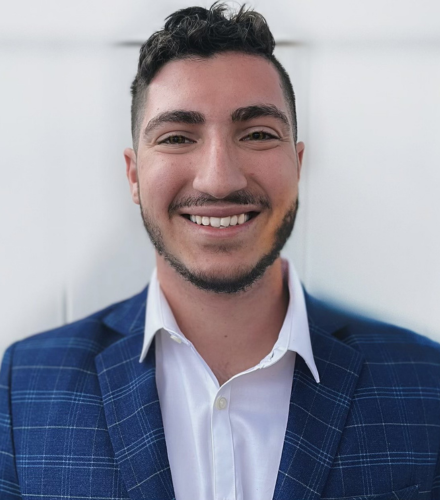Ryan Shargo made the most of his time at the Judy Genshaft Honors College. Along his
path from the Allen Building to the Morsani College of Medicine, Shargo observed transplant
surgeons in the operating room, conducted pediatric craniofacial research, worked
in community gardens at both the University of South Florida (USF) and the Dominican
Republic, and began a health information campaign that has grown to include dozens
of current students.
This would be an impressive list of accomplishments for any student, but the fact
that Shargo earned his bachelor’s degree in three and a half years during the height
of the COVID-19 pandemic, makes his experience even more remarkable.

Follow Your Research Interests
Shargo entered USF in the fall of 2019 intent on conducting research. His December 2019 service-learning trip took him to the Dominican Republic to work with the Kerolle Initiative for Community Health, an experience that shaped his understanding of the connections between food, health, and literacy. This perspective led him to get involved in local initiatives, such as the Judy Genshaft Honors College Community Garden, while continuing to learn more about the Dominican Republic. In the summer of 2020, he enrolled in a virtual internship with the Kerolle Initiative to further his research on the health conditions he observed while traveling and to continue to build the foundations of his research experience.
A Unique Experience
To gain clinical research experience, Shargo applied for the Tampa General Hospital (TGH) Summer Transplant Research Internship and was selected for the summer of 2021.
The TGH internship seeks to provide a unique experience for a select group of undergraduates, where students participate in transplant-related clinical research with a mentoring physician. The internship gives students the opportunity to shadow physicians in a hospital setting and participate in lectures on transplant-related topics, but the program's primary objective is to complete a research project all the way through abstract or manuscript completion.
While investigating complex issues in transplant care with students, researchers, and physicians from LifeLink and TGH, Shargo observed surgeries, participated in organ procurement and an honor walk for families of organ donors, learned how to run a research study, and gained a new appreciation for how to approach academic writing.
“Conducting research gave me the opportunity to contribute to the knowledge base. My team’s work is useful to the field and can improve the quality of care for patients. I find that very satisfying,” said Shargo.
Ryan’s Research Advice
- Leverage your connections and people you know in labs. Talk to people who are doing research about opportunities in research.
- Take on as much responsibility as the principal investigator (PI) will let you. Don’t be afraid to branch out and expand your skill set to have knowledge of all the parts that go into a manuscript. When you start your own projects in the future this will make you more independent and help you.
- Be open. I was pre-med and am doing pre-dental research. Remember: Any experience is better than no experience.

Lasting Impact
Shargo’s research opportunities grew throughout his time at USF – much like his senior thesis project. What began as a project focusing on chronic conditions in low resource Dominican communities has exploded into a growing collection of infographics in Spanish and Kreyol and a book project involving dozens of students, faculty, and health professionals in the U.S. and abroad.
Shargo has begun his next chapter at the Morsani College of Medicine, but offers this advice for the next generation of Honors students: “Be persistent and be patient. Sometimes research takes way longer than you think. I’ve been doing a study for two and a half years, and we are just starting to write the manuscript. Also, be ready for new opportunities. I found my research position in the Honor Roll. You never know where your Honors journey will take you.”
